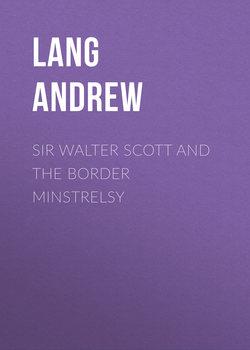Sir Walter Scott and the Border Minstrelsy

Реклама. ООО «ЛитРес», ИНН: 7719571260.
Оглавление
Lang Andrew. Sir Walter Scott and the Border Minstrelsy
SCOTT AND THE BALLADS
AULD MAITLAND
OLD MAITLAND. A VERY ANTIENT SONG
II. WHAT IS AULD MAITLAND?
THE BALLAD OF OTTERBURNE
SCOTT’S TRADITIONAL COPY AND HOW HE EDITED IT
THE MYSTERY OF THE BALLAD OF JAMIE TELFER
I. A RIDING SONG
II. THE BALLAD IMPOSSIBLE
III. COLONEL ELLIOT’S CHARGE AGAINST SIR WALTER SCOTT
IV. WHO WAS THE FARMER IN THE DODHEAD IN 1580–1609?
V. MORE IMPOSSIBILITIES IN THE BALLAD
VI. IS THE SCOTT VERSION, WITH ELLIOTS AND SCOTTS TRANSPOSED, THE LATER VERSION?
VII. SCOTT HAD A COPY OF THE BALLAD WHICH WAS NOT THE SHARPE COPY
Conclusion
KINMONT WILLIE
CONCLUSIONS
Отрывок из книги
It was through his collecting and editing of The Border Minstrelsy that Sir Walter Scott glided from law into literature. The history of the conception and completion of his task, “a labour of love truly, if ever such there was,” says Lockhart, is well known, but the tale must be briefly told if we are to understand the following essays in defence of Scott’s literary morality.
Late in 1799 Scott wrote to James Ballantyne, then a printer in Kelso, “I have been for years collecting Border ballads,” and he thought that he could put together “such a selection as might make a neat little volume, to sell for four or five shillings.” In December 1799 Scott received the office of Sheriff of Selkirkshire, or, as he preferred to say, of Ettrick Forest. In the Forest, as was natural, he found much of his materials. The people at the head of Ettrick were still, says Hogg, 3 like many of the Highlanders even now, in that they cheered the long winter nights with the telling of old tales; and some aged people still remembered, no doubt in a defective and corrupted state, many old ballads. Some of these, especially the ballads of Border raids and rescues, may never even have been written down by the original authors. The Borderers, says Lesley, Bishop of Ross, writing in 1578, “take much pleasure in their old music and chanted songs, which they themselves compose, whether about the deeds of their ancestors, or about ingenious raiding tricks and stratagems.” 4
.....
By these methods Scott composed “a standard text,” now the classical text, of the ballads which he published. Ballad lovers, who are not specialists, go to The Minstrelsy for their favourite fare, and for historical elucidation and anecdote.
Scott often mentions his sources of all kinds, such as MSS. of Herd and Mrs. Brown; “an old person”; “an old woman at Kirkhill, West Lothian”; “an ostler at Carlisle”; Allan Ramsay’s Tea-Table Miscellany; Surtees of Mainsforth (these ballads are by Surtees himself: Scott never suspected him); Caw’s Hawick Museum (1774); Ritson’s copies, others from Leyden; the Glenriddell MSS. (collected by the friend of Burns); on several occasions copies from recitations procured by James Hogg or Will Laidlaw, and possibly or probably each of these men emended the copy he obtained; while Scott combined and emended all in his published text.
.....